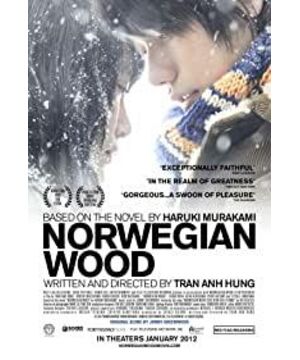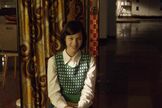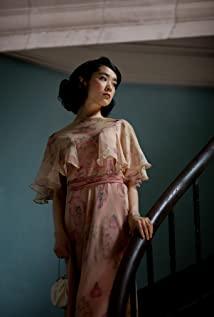It is impossible to fully interpret this novel in two hours. The script is everything, and the editing is everything. All aspects of the film elements can create a derivative of the original, and each derivative can be very different. The works that I understand, every vivid character in the works, have more or less discrepancies in the expression of the film, which is a certain regret, and it can also be regarded as creating some motivation for my future film career. In the second half, I was joking.
In terms of characters, Watanabe created by Kenichi Matsuyama is not as profound and taciturn as I imagined. Watanabe in the movie seems to be more like a handsome and slightly shy big boy. Much of Watanabe's personality has not been revealed. The book is more about Watanabe's psychological activities, his complicated feelings for Naoko, his deep desire for Midoriko's fresh vitality, and the loneliness and distress of exchanging girlfriends, all of which can be felt in the book. . In the movie, his psychological activities can be interpreted as "because Naoko is a lunatic, so I can't stand it anymore, and I am in love with Midori", and describe the complex feelings for Naoko as simple and difficult to shirk. "responsibility". After Naoko's death, Watanabe cried loudly on the seaside reef, which is not in the original, nor should it be. Watanabe is a person who is not good at expressing his feelings, and more like to hide his feelings in his heart. In the process of the film, there is no mise-en-scene, framing, editing, etc. to interpret this hidden emotion, but instead expresses Watanabe as a person with exposed emotions.
Likewise, the personalities of Naoko and Midori are not revealed. The screen is more of two morbid and mediocre women. During the promotion of the movie, two concepts were mentioned: "strong く生きること" and "deep love すること". The director took the understanding of these two women to extremes, as if Naoko existed to survive, and Midori was a girl who was simply in love. And ignoring this entanglement of survival and love exists in every character. Why did Naoko become like this? The movie didn't explain it clearly. If I didn't read the original book, I thought she was just crazy. And Naoko's tenderness, the pain of not being able to integrate into this world that she constantly entangled in her heart, was all ignored by the movie. Naoko and Watanabe were alone, and there were many times when Naoko had a sudden attack, and the reaction was very violent. In the book, Naoko is more of a quiet, very vulnerable, shy Japanese woman. It is these characteristics that attract Watanabe. Relatively speaking, what makes Midoriko attractive in the original book is her tenacious vitality. Midori is the only one in the book who lives without perversion. The reason why Midoriko is favored by Watanabe is because of her straightforwardness and her seemingly strange theories. And the movie is disappointing at this point. Midoriko's magical remarks are not left. Some of them are just that she deceived Watanabe about her father, and she is inexplicably angry with Watanabe, but it is not from the movie plot. The source of anger can be deduced.
My favorite character in the book is Yongze. Yongze's portrayal is finally authentic, at least the more important elements of his character are there, but careful scrutiny is still insufficient. For example, Yongze's powerful aura has not been shown, and many of his classic views on the future, on sex, and on human nature are not reflected in the slightest. Therefore, the phrase "sympathizing with myself as a coward" that Watanabe said before he moved seemed very abrupt. The part where Watanabe, Nagasawa and Hatsumi eat should be the focus of the original theme, and a lot of what Murakami wanted to say was revealed in that conflict. And the interpretation of the film only regards Hatsumi as a grumpy woman who is submissive. Hatsune Eriko definitely feels like Hatsumi, but the lines imposed on her distort her personality. Hatsumi in the original book is a great woman who is very self-disciplined and doesn't care about her skills. In the eating part of the original book, the reason why Hatsumi asked Watanabe about sleeping with a girl was just to hope that he would not repeat the same mistakes of Yongze, and did not mean to teach Yongze. In the movie, Hatsumi is very entangled in the matter of Watanabe's exchange of girlfriends, as if he is interrogating Yongze. And the really nutritious conversation, the conversation about Nagasawa and Watanabe's view of the world and their surroundings, was not written in the script. Instead, Hatsumi slammed out of the door in a fit of anger, and this is a mistake for Hatsumi, who is very tolerant. interpretation. After eating, Hatsumi and Watanabe played billiards together, and went to Hatsumi's house to bandage the wound, which was ignored. Of course, this is also understandable. As I said, it is impossible to get the best of Murakami in 2 hours. However, there is a description that has stuck in my mind to this day. A few years later, Watanabe looked at the crimson sunset outside a Mexican-style restaurant in the southern United States, and suddenly thought that this seemingly weak but shocking force was just like in those days. Same as the first beauty. It seems that the director has not completely forgotten this, so in the taxi, the light on Hatsumi's face changed. There was a red light for a few seconds, probably from the neon outside the car window, but the light in that moment was different. Disappearing in the perpetual gloom is also a harbinger of misfortune. In addition, the last time Watanabe saw Hatsumi in the original work was when she was leaving Hatsumi's house that night when Hatsumi's phone rang, and Hatsumi answered the phone without hesitation. This parting scene indirectly took the tragedy of Hatsumi's final suicide. From this point of view, it is understandable even if the movie does not tell her that she finally cut her wrists.
Reiko's story should be the most abridged, such as her and that serious liar lesbian story. Reiko has completely become a supporting role. Since Naoko was not portrayed as weak enough, and Reiko's mother's surname cannot be reflected, her relationship with Naoko seems to be just roommates. In my impression, Reiko seems to be able to turn all her emotions into music, but in the movie, her outspoken and cheerful character is gone. Even in the last paragraph at Watanabe's house, Reiko's dress is not as isolated from the world as it is described in the book, and her relationship with Watanabe is not as familiar as it is described in the book. In the end, the reason why Reiko and Watanabe had a relationship was not because of Reiko's thirst for a while, but because the two were deeply nostalgic for Naoko, as if hugging Naoko's body to find a sense of Naoko's existence. This is not reflected in the movie.
If the movie impresses me the most, it should be its sounding. I was also listening to the OST while writing this review. Watanabe said "もちろん" many times in the movie, perhaps the word "of course" itself is the closest to Watanabe's character. The composing of music is mainly divided into two parts, one is the rock and roll of the 1950s and 1960s that Murakami admires, and the other is the painful and tangled melodies outlined by the violin. In the movie, the switch from Tokyo to Ameliao is always accompanied by sudden changes in sound effects. This is different from the scene switching and music gradation in most movies. The sudden changes set off the estrangement between Naoko, Ameliao and the outside world, and the side also paved the way for Naoko's suicide. In addition, the changes in the loudness of the music are also vividly displayed, adding a dramatic effect and shock to a series of trivial shots.
Mise-en-scene is what most people are satisfied with. From this point of view, what Chen Yingying did is a bit like Zhang Yimou. They exaggerated the description of the scenery, especially the description of grassland, weeds and sea. , a bit over the top. The symbolic meaning of "Norwegian Forest" is greater than the actual meaning, and the director always felt that since he mentioned もり, he should describe the scene with real guns and live ammunition. There seems to be more ostentation than the narrative needs. To be honest, I really didn't expect the Norwegian forest to have the effect of a horror movie, but the scene where Naoko died did give me a bit of a creep. The music transitions to a horrifying melody, the frequency is increasing, and the loudness is also increasing. Although the picture is not black and white, the tone gradually becomes colder, and the contrast is clear. At this time, there are two calves covered with mud, hanging in the air. The loudness and frequency of the music reached the maximum at the same time, and the picture stayed for half a minute. Then, in the violent music, the waves crashed on the shore, and the horror film turned into a disaster film. The various scenes of Watanabe lying alone in the wild constitute a set of montages, which is unexpected, and finally the part of survival on the deserted island is okay. Also worth mentioning is the use of light, it should be understandable. Mainly the yellow tones of the old photos and the gray-blue tones of the morning sun, and then the green in the scenery, have played a great role in rendering the storyline in different scenes.
If the disappointment is more disappointment to editing. Many people who watched the movie complained that it became too fragmented and lost a sense of the whole. And even if it is a movie with many fragments, it still loses a lot of Murakami's essence. Murakami's novels have a weak sense of rhythm, which lays the foundation for fragmentation. In addition, it was because the editing of the movie was too abrupt, and the editing of the sound effects scenes and the time span were not well connected. Whether intentional or unintentional, there is always a feeling of unfinished business. No conflict took more than ten minutes, that is to say, no paragraph was a complete analysis, and the words disappeared as soon as the content was pointed out.
I have always liked the aspect ratio of Japanese movies. The aspect ratio of 2.35:1 should be an excellent choice for beautiful movies, at least the scenes are more grand. There are many Japanese directors who use 2.35:1 size, such as Akira Kurosawa. Under this aspect ratio, proper composition can fully express the subtle relationship between the characters, the psychological activities and intentions of the characters, etc. Perhaps the reason why the Japanese like this aspect ratio is because of the introverted nature of their own culture, they don't like to express all their feelings. And the role framing plays in side-by-side hits cannot be underestimated. There are of course some manifestations in this movie. For example, although this wide screen can theoretically accommodate multiple characters in one shot, the director chose the way of split shots, which makes each character in the The compositions are all more lonely, thus deepening the distance between people. I thought about it for a while and thought about this benefit. Maybe after watching it for the second and third times, I will have a new awareness of the director's way of thinking. What's a little bit puzzling is that when Hatsumi questioned Watanabe why he was looking for a girlfriend, there was a zoom in on the camera, which brought Hatsumi's profile closer. I don't know what I want to show, do I want to say that her profile is really beautiful? If this scene is for me to design, I’m afraid I won’t use split shots. Maybe the distance between the characters, the composition of the positions, and the size of each character’s screen are all opportunities for expressing ideas.
Writing so many things in one breath is really due to the deep love for the Norwegian forests. In many places, it may be too superficial. After all, I am a person who has just been exposed to movies, and some are just jerky thinking and jerky brushstrokes that have not been written in Chinese for a long time.
View more about Norwegian Wood reviews











